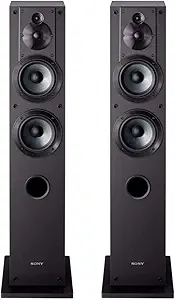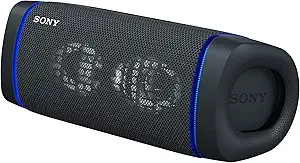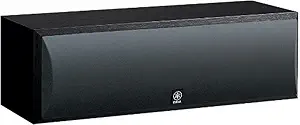In the realm of audio equipment, the choice of speakers can significantly impact the overall listening experience. Two prominent contenders in the speaker market are Yamaha and Sony, each bringing their own unique blend of technology, craftsmanship, and sound engineering to the table. In this article, we'll delve into the features, performance, and reputation of Yamaha and Sony speakers to help you make an informed decision for your audio setup.
Brand Overview
Yamaha, renowned for its commitment to audio excellence, offers a diverse range of speakers catering to various preferences and requirements. From sleek bookshelf speakers to immersive home theater setups, Yamaha's lineup boasts meticulous craftsmanship and innovative technology. One of the key highlights of Yamaha speakers is their exceptional sound quality, characterized by crisp highs, rich midranges, and deep, resonant bass. Whether you're a music enthusiast, a cinephile, or a gaming aficionado, Yamaha speakers deliver immersive audio performance that elevates your entertainment experience. Additionally, Yamaha's attention to detail extends to design aesthetics, with speakers that blend seamlessly into any living space while exuding sophistication and style.
Sony, a global powerhouse in consumer electronics, brings its signature blend of cutting-edge innovation and reliability to the realm of speakers. Sony speakers are engineered to deliver a balanced audio experience, with a focus on clarity, accuracy, and versatility. Whether you're streaming music, watching movies, or gaming, Sony speakers excel in reproducing nuanced soundscapes with precision and fidelity. Sony's commitment to technological advancement is evident in features such as wireless connectivity, customizable sound profiles, and compatibility with virtual assistants, offering users a seamless and intuitive audio experience. Moreover, Sony speakers are designed with convenience and flexibility in mind, catering to modern lifestyles with compact designs, portable options, and easy integration into smart home ecosystems.
Key Features Comparison
Size
When considering the size aspect of Yamaha and Sony speakers, there are noticeable differences that can impact a consumer's decision. Yamaha speakers, particularly models such as the Yamaha NS-333, are known for their compact size, designed to deliver high-quality sound without occupying much space. This makes them ideal for smaller rooms or for users who prefer a more minimalist aesthetic. However, the smaller size may limit the bass response and overall sound output, which could be a drawback for some users. On the other hand, Sony speakers, especially models like the Sony SSCS3, are generally larger in size. This larger size often allows for a more robust sound profile, including deeper bass and richer overall sound. However, the larger size also means they will take up more space, which could be a disadvantage in smaller rooms or for users seeking a more streamlined look. Despite the size, Sony has incorporated innovative technologies such as the Mica Reinforced Cellular cone for more precise audio reproduction. Comparatively, both brands offer high-quality sound, but the choice between them may come down to a trade-off between size and sound quality.
Battery life (for portable speakers)
Yamaha and Sony are two reputable brands in the audio industry, both offering a range of portable speakers with varying battery life. Yamaha's MusicCast 20, for instance, offers around 5 hours of playtime on a single charge. This is a decent battery life for a portable speaker, allowing users to enjoy their music for extended periods without worrying about recharging. However, it's worth noting that this battery life can dwindle faster if you're using the speaker at its maximum volume or connecting it to other devices via Bluetooth. On the other hand, Sony's SRS-XB43, one of their latest portable speakers, boasts an impressive battery life of up to 24 hours. This significantly longer battery life is a major advantage for those who require a speaker that can last for an entire day or night. However, similar to the Yamaha speaker, the battery life of the Sony SRS-XB43 can also decrease faster if used at higher volumes or when the EXTRA BASS mode is activated. Comparatively, Sony offers a more robust battery life in their portable speakers than Yamaha, making it a more suitable choice for users who prioritize longer playtimes.
Product Selection
Yamaha and Sony, both are renowned brands in the audio equipment industry, offering a wide range of speakers to cater to different user needs. Yamaha's product selection is quite diverse, including soundbars, home theater systems, outdoor speakers, studio monitors, and more. They have been consistently incorporating the latest technologies in their products, such as MusicCast multi-room technology and DTS:X 3D surround sound. However, a drawback for some consumers might be the price, as Yamaha's high-quality speakers often come with a higher price tag compared to other brands. On the other hand, Sony also offers an extensive selection of speakers, including portable Bluetooth speakers, soundbars, home theater systems, and high-resolution audio speakers. Sony has been a pioneer in incorporating cutting-edge technology in their speakers, such as EXTRA BASS and 360 Reality Audio technology. Sony speakers are often praised for their sound quality and durability. However, some users have pointed out that Sony's user interface and software could be more intuitive. When compared to Yamaha, Sony offers a more affordable range of speakers, making it a popular choice among budget-conscious consumers.
Availability
Yamaha and Sony are two prominent brands in the audio equipment industry, each offering a diverse range of speakers. When it comes to availability, both brands have a strong global presence, with their products being accessible in physical stores and online platforms. Yamaha Speakers, for instance, are available in most major electronics retailers and can also be purchased directly from the Yamaha website or other online marketplaces like Amazon and eBay. The brand's latest models, such as the Yamaha MusicCast 50 and the NS-5000, are widely available and come with advanced features like MusicCast multi-room technology and ZYLON woofer for improved sound quality. On the other hand, Sony Speakers are also easily accessible worldwide. Sony has a vast network of retail stores and their speakers can also be found in most electronics retailers. Online, Sony Speakers are available on the brand's official website, Amazon, eBay, and other online retailers. Sony's latest speaker models, like the SRS-XB12 Portable Wireless Bluetooth Speaker and the HT-Z9F 3.1ch Dolby Atmos Soundbar, are readily available. These models boast features like EXTRA BASS for deep, punchy sound, and Dolby Atmos technology for cinematic audio. Both brands have made their products easily accessible to consumers, making it easier for audiophiles to acquire high-quality speakers.
Design/Look
Yamaha and Sony speakers both have a distinct design and look that cater to different aesthetic preferences. Yamaha speakers often feature a classic, timeless design with a focus on simplicity and functionality. The latest models like the Yamaha NS-333 bookshelf speakers have a glossy black finish and a traditional boxy shape, with the brand's logo subtly placed on the front. The design is minimalist, yet elegant, and can fit seamlessly into any home decor. On the other hand, Sony speakers are known for their modern and sleek designs. They often incorporate cutting-edge technology not just in their audio components, but also in their design elements. For instance, the Sony SRS-XB12 portable Bluetooth speaker has a compact, cylindrical design that is both stylish and portable. It also comes in a variety of vibrant colors, adding a pop of personality to the device. However, some might find Sony's design too modern or flashy compared to the understated elegance of Yamaha speakers. Both brands have their unique design language that caters to different user preferences, making them both strong contenders in the audio equipment market.
Affordability
When comparing the prices of Yamaha and Sony speakers, it's clear that both brands offer a range of options to suit different budgets. Yamaha speakers, known for their high-quality sound and innovative technologies like MusicCast for multi-room audio, typically have a slightly higher price point. For instance, their high-end models like the Yamaha NS-5000 can cost several thousand dollars, but they also offer more affordable options such as the Yamaha NS-AW194 outdoor speakers, which are priced under $200. Sony speakers, on the other hand, are generally more affordable across the board, making them a popular choice for those on a tighter budget. Sony offers a variety of speakers, including portable Bluetooth speakers, soundbars, and home theater systems, with prices ranging from under $50 to over $1,000. Their high-end models like the Sony SRS-XB43 EXTRA BASS Portable Bluetooth Speaker, which features innovative technologies such as dual passive radiators and a Party Connect function, are priced competitively under $250. However, it's important to note that while Sony speakers are generally more affordable, some users feel that the sound quality is not as high as that of Yamaha speakers.
Quality/Durability
When it comes to quality and durability in the audio and home entertainment category, both Yamaha and Sony speakers have their strengths. Yamaha speakers are known for their exceptional sound quality, thanks to their advanced technology such as the Twisted Flare Port that contributes to clear and tight bass. The build quality of Yamaha speakers is also commendable, with most models featuring a robust and durable design that can withstand the test of time. However, some users have reported that the bass response can be inconsistent at times. On the other hand, Sony speakers are lauded for their durability and high-quality sound. They employ innovative technologies like the Extra Bass feature for deeper, punchier bass, and the LDAC for transmitting three times more data than conventional Bluetooth. Sony’s build quality is also top-notch, often featuring a water-resistant design for outdoor models. However, some users have complained about the Sony speakers' battery life, stating it doesn't last as long as advertised. Comparatively, both brands offer high-quality and durable speakers, but the choice between the two often comes down to personal preference and specific needs.
Reputation
Yamaha and Sony are both renowned brands in the audio industry, each with a distinct reputation. Yamaha speakers are known for their exceptional sound quality, durability, and innovative technology. The brand has consistently been a leader in audio technology, with their latest models featuring MusicCast multi-room technology and built-in voice control from Amazon Alexa. However, while Yamaha is praised for its sound quality and durability, it is also often critiqued for its higher price point compared to other brands. On the other hand, Sony speakers are celebrated for their sleek designs, affordability, and impressive bass response. Sony's latest models boast features such as Extra Bass technology and Bluetooth connectivity, offering a more immersive listening experience. Despite their affordability, some users have reported that Sony speakers can lack the durability and longevity that other brands, such as Yamaha, offer. In terms of brand reputation, Sony is often seen as more consumer-friendly due to its lower price point and user-friendly designs, while Yamaha is viewed as a more premium, professional-grade option.
Sound Quality
When comparing the sound quality of Yamaha and Sony speakers, it's important to note that both companies have made significant strides in audio technology. Yamaha speakers are known for their Natural Sound technology, which aims to reproduce all music as it was intended to be heard. They are often praised for their clear and detailed sound, particularly in the mid-range frequencies. Yamaha speakers also tend to have a wide soundstage, making them ideal for larger rooms. However, some users have noted that Yamaha speakers can sometimes lack a bit in bass response. On the other hand, Sony speakers are renowned for their Extra Bass technology, providing a deep and punchy bass that can really enhance music and movie audio. They also feature High-Resolution Audio, which can deliver superior sound quality by capturing music at a higher rate than CD, increasing both audio samples per second and the bitrate accuracy of each sample. However, some users have reported that Sony speakers can sometimes struggle with higher frequencies, leading to a less detailed sound in the treble range. It's also worth noting that while Sony speakers are generally more affordable than Yamaha, they may not offer the same level of build quality and longevity. In comparison to other brands, both Yamaha and Sony have their strengths and weaknesses in sound quality. The choice between the two often comes down to personal preference and the specific audio needs of the user.
Related Video
Conclusion
When it comes to the aspect of sound quality and technological advancements, both Yamaha and Sony speakers have their unique strengths. Yamaha speakers are known for their Natural Sound technology, which aims to reproduce all music as it was intended to be heard. They are also appreciated for their durability and the quality of materials used, ensuring a long-lasting product. On the downside, some users have reported that Yamaha speakers can sometimes lack in the bass department. Sony, on the other hand, has been consistently innovating with features like Extra Bass technology and 360 Reality Audio, which creates a full, rich, and immersive sound experience. Sony speakers also tend to be more portable and versatile, with many models offering waterproof and dustproof features. However, Sony speakers can sometimes fall short in terms of sound clarity when compared to Yamaha, especially at higher volumes. It's also worth noting that Sony speakers are generally more expensive than Yamaha. In comparison to other brands, both Yamaha and Sony hold their ground well, each offering a unique sound experience that caters to different user preferences.




















